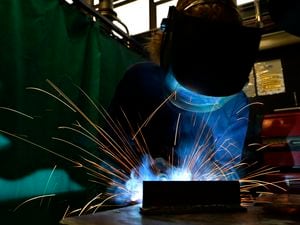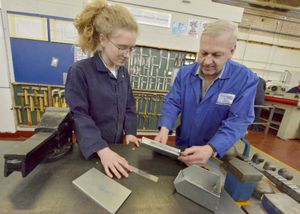National Apprenticeship Week: Aspiring engineers forging their own future
Providing students with vital on-the-job training as well as the chance to earn while they learn - the value of apprenticeships has long been championed.

And for employers, apprentices are also playing an increasingly important part in bridging our nation's skills gap, helping the future of a vast range of industries from engineering to nursing and law to design.
Today marks the start of National Apprenticeship Week,which aims to shine the spotlight on apprenticeships and encourage more young people to consider them as the pathway to they career they want.
It comes as Sue Husband, director of the National Apprenticeship Service, said 2018 was a crucial year as the government works towards achieving three million placements by 2020.
"We know that apprenticeships are having a growing impact on employers and individuals across the country, but we know we can do more.
"The government is committed to ensuring that there is an apprenticeship out there for everyone and is taking steps to increase the number of apprenticeships on offer, investing £2.5billion to reach the target of three million apprenticeship starts by 2020.
"But we do not just want to see more apprenticeships - we want better apprenticeships in more sectors, covering more roles and we want to persuade more employers to offer apprenticeships," she said.
"The past year has seen significant changes to the way that apprenticeships are funded. Our apprenticeship reforms, the largest government has ever made, have put control back into the hands of employers so they will gain the skilled workforce they need to compete globally. The introduction of a UK-wide apprenticeship levy last April have been a crucial part of these reforms, helping to fund a step change in apprenticeship numbers and quality.
"Through the levy, £2.5 billion will be invested in apprenticeships by 2019/20, double the amount spent in 2010/11. Employers with a pay bill of over £3 million pay 0.5 per cent through the levy each month, which can then be reinvested in training and assessments either for new apprentices or to up-skill existing employees, via the online apprenticeship service. Meanwhile, non-levy paying employers – those with a pay bill under £3m – receive 90 per cent of apprenticeship training and assessment costs.
"With more money than ever, we will be helping people get into more and better quality apprenticeships. We expect employers to take their time to plan high quality, well thought through apprenticeship provision that meets their specific needs, with two years to spend their levy funds, and maximise the opportunities an apprenticeship can bring for both the learner and employer," added Ms Husband.

Among the many apprentices in the Black Country and Staffordshire who are reaping the benefits is 18-year-old Carys Lewis-Waterfield, from Bilston, who is following in her father’s footsteps by doing an engineering apprenticeship and working for him in the family’s steel fabrication firm Longhart in Tipton.
“I’ve grown up around engineering and sitting behind a desk at a computer isn’t for me. I need to be doing something practical which is why an apprenticeship is perfect as I’m learning practical skills, gaining a qualification, getting paid and, at 18, am already on the career ladder,"she said.
Carys, who attends college two days-a- week to study for the Level 2 diploma in fabrication and welding, added: “Combining working and studying is a great way for me to learn as when I’m doing something at work I can relate it back to what I’ve been taught at college, and my dad’s happy as he knows I’m learning the correct way to do things and gaining the theory to back up the practical skills he’s teaching me.
“People think that engineering is just for males but it isn’t. My advice to young women who want to get into engineering is ‘don’t follow other girls because that’s what you think you should do – don’t be afraid to get your hands dirty, you can do it if you want to.’”
Holly Broadhurst, 23, is a full-time design engineer at global manufacturer, JCB, based in Stafford.

She started a higher apprenticeship in engineering in September 2012. Less than six years on, Holly has completed her apprenticeship and has a BEng honours degree in mechanical engineering under her belt.
Holly is on track to become a fully chartered engineer and plans to enrol onto a masters course, supported by her employer.
“In such a short space of time I’ve learnt and gained so much more than I ever thought possible,” she said.
Emma Goulding, 25, from Stourbridge, is a controls engineer for Siemens. After leaving school with three A-levels, she was unsure about the university route. Keen to pursue a learning path that would expose her to opportunities in industry, Emma saw the advanced engineering apprenticeship at Siemens as the ideal course for her.
“I’d always been interested in how and why things work but doing an apprenticeship in engineering has allowed me to broaden my horizons and experience the best of both worlds – learning first-hand the skills needed to work in the industry, alongside formal academic study," she said.
“I’m now in a full-time role and being sponsored to study for a mechanical engineering (BEng) degree – but best of all I get paid to do something I really enjoy," added Emma.
*To find out more about taking on an apprentice see hireanapprentice.campaign.gov.uk while people looking for more information and support on applying for an apprenticeship can visit getingofar.gov.uk





